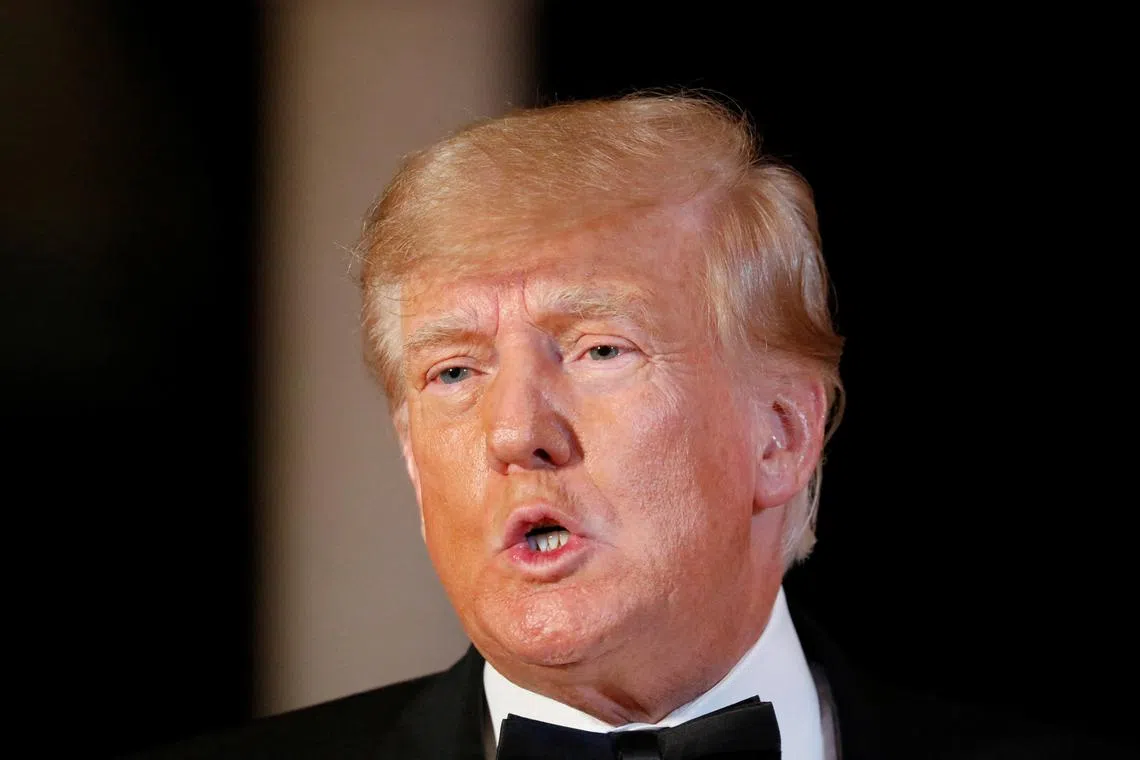Court weighs immunity for Donald Trump in defamation case over rape claim
Sign up now: Get ST's newsletters delivered to your inbox

E. Jean Carroll’s case is one of many legal clouds over Donald Trump as he runs for the White House in 2024.
PHOTO: REUTERS
Follow topic:
WASHINGTON - A Washington appeals court on Tuesday considered whether Mr Donald Trump should be immune from author E. Jean Carroll’s defamation lawsuit stemming from the former US president’s 2019 denial that he raped her.
An eight-judge panel of the district’s highest local court is expected to decide whether Mr Trump was acting as president when, in response to a reporter’s question, he accused the former Elle magazine columnist of lying about the alleged mid-1990s encounter.
During more than 2.5 hours of oral arguments, Mr Trump’s lawyer Alina Habba said there was great public interest in letting presidents “deal fearlessly with the American people” when fielding questions from reporters and constituents, entitling Mr Trump to broad immunity covering Ms Carroll’s claim.
Mr Joshua Matz, a lawyer for Ms Carroll, countered that Mr Trump has a long history of making “highly personal attacks on women who credibly accuse him of having engaged in sexual misconduct”. And “that tends to suggest that the motivation is not really anything relating to their job. That’s just how they roll”.
Ms Carroll described her alleged encounter with Mr Trump in a June 2019 New York magazine excerpt from her memoir, saying that Mr TTrump raped her in a Bergdorf Goodman department store dressing room in Manhattan.
Mr Trump later told a reporter at the White House that he did not know Ms Carroll, that “she’s not my type”, and that she had concocted the rape claim to sell her book. He has also denied sexual misconduct claims by several other women.
In September 2022, a federal appeals court in Manhattan asked the Washington court to weigh in on whether under District of Columbia law Mr Trump had spoken within the scope of his role as president, or in his personal capacity as Ms Carroll argued.
If Ms Carroll wins, she can further pursue the first of her two defamation cases against Mr Trump in Manhattan federal court, with a trial scheduled for April 10.
A victory for Mr Trump would likely end that lawsuit, and could provide broad immunity to presidents from defamation claims over statements they make while in office.
The Biden administration supported Mr Trump’s immunity claim, while criticising his “crude and offensive” comments.
Regardless of the outcome, Ms Carroll could still pursue her second lawsuit,
That lawsuit also includes a battery claim under New York’s Adult Survivors Act, a new law that lets adults sue their alleged attackers even if statutes of limitations have expired.
Ms Carroll’s case is one of many legal clouds over Mr Trump as he runs again for the White House in 2024.
During Tuesday’s arguments, several judges expressed concern they had no factual record about what motivated Mr Trump to speak, and questioned where to draw the line when presidents speak about public matters.
Judge Joshua Deahl asked Mr Mark Freeman, a Department of Justice lawyer, whether Mr Trump would have been acting as president if he brushed off advisers who recommended he ignore Ms Carroll, and instead decided to “take her down. That’s the way I live my life”.
Mr Freeman said no, if Mr Trump were acting purely for personal reasons.
But he added: “It would be exceptionally rare to come to that conclusion with respect to the president of the United States answering a question from a reporter at the White House.”
Ms Habba countered that Mr Trump would be shielded if he spoke with even the slightest motivation to serve the people.
Judge Catharine Easterly asked her: “If the motivation is 99.99 per cent personal and 0.01 per cent for the employer, does that mean you think he acted in the scope of his employment?“
“I do,” Ms Habba replied.
The appeals court did not say when it will rule. REUTERS

